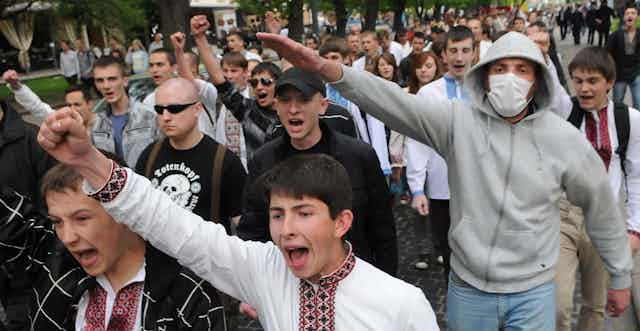Following days of protest and the ousting of President Viktor Yanukovych, Ukraine’s new interim government was announced on 26 February 2014. This is not an ordinary government. Politicians linked to the extreme right-wing Svoboda party have taken up important posts, including deputy prime minister, the heads of the agriculture and environmental ministries, and a chief law officer.
This is partly the result of the fact that Svoboda leader Oleh Tyahnybok was a key figure in the Euromaidan protests, but it also reflects the party’s electoral strength. Svoboda is one of Ukraine’s five major parties. It experienced a dramatic boost in the 2012 Parliamentary elections, capitalising on a strong protest vote against corruption to enter parliament for the first time: it received 10% of the vote, translating into 37 seats.
The party was founded in the early 1990s under the name “Social-National Party of Ukraine”, clearly alluding to the ideology of National Socialism. Under Tyahnybok’s leadership in the mid-2000s, the party changed its name to All-Ukrainian Union “Svoboda” in an attempt to distance itself from overt references to Nazism and appear less extreme.
But despite this modernisation effort, the party remains staunchly anti-communist. It presents itself as the only defender of Ukrainian identity, religion and culture. For Svoboda, membership of the Ukrainian nation is ethnically defined on the basis of language, blood and creed. As such, party membership is restricted to ethnic Ukrainians, and eligibility is denied to both atheists and former communists. Its electoral program (entitled Program for the Protection of Ukrainians) argues that the main purpose of the party is to “build a powerful Ukrainian State based on the principles of social and national justice” – which can be read as an implicit acceptance of National Socialism.
Svoboda has an anti-Semitic and anti-Russian agenda, using references to a “Muscovite-Jewish mafia” to tie together two perceived enemies of the nation. The party was the key organiser of a recent rally on 1 January 2014 in honour of the 105th birthday of Ukrainian nationalist Stepan Bandera, a controversial figure in Ukrainian history.
In 2010, Bandera was posthumously honoured by President Viktor Yushchenko as a “Hero of Ukraine” for being the leader of Ukraine’s liberation movement. However, Bandera had an ambivalent relationship with Nazi Germany. He is dismissed by some as a Nazi collaborator, working against the Russians and the Jews of the Soviet Union. Demonstrators associated with the party shouted “Glory to Ukraine!” and “Death to the enemies!”, and were dressed in the uniform of a Ukrainian division of the German army in World War II.
Svodoba and the new Ukraine
Svoboda’s involvement in the recent protests has been characterised by radical anti-Moscow rhetoric, which is fuelling anti-Russian sentiment among the Ukrainian population. Party members are clearly ready to defend the motherland. On 4 March 2014, Tiahnybok stated:
We stress that no one should speculate on the underlying constitutional principles: language, nationality, the unitary state. I urge all to be ready to defend Ukraine. In the case of a real military intervention, we should battle the enemy and win. Not a piece of the Ukrainian land should be surrendered to the invaders!
Parliament’s recent decision to remove the official status of the Russian language following Svoboda’s intervention may be interpreted as an act of discrimination against Ukraine’s Russian-speaking citizens, estimated at around a quarter of the population. This has instigated a backlash from Ukraine’s Russophones, further dividing the country. Pro-Russia groups are increasingly active in various provinces of eastern Ukraine, calling for “local resistance” against the government in Kiev and seeking independence from a country they feel they no longer belong to.
It remains unclear what Svodoba’s status will be after the presidential elections in May 2014. The party’s agenda, completely out of line with the principles of procedural democracy, is clearly antithetical to a united Ukraine; its participation in the interim government may have serious consequences for the country’s relations with its neighbours, the international resolution of the crisis, and the domestic handling of the crisis.
Externally, government decisions instigated by Svoboda may legitimise Russia’s own aggressive policy, and may make direct talks between Russia and the interim government less likely. Internally, Svoboda’s policy may contribute to the rise of protest and violent acts against those considered as ethnically non-Ukrainian, as well as backlash from Ukraine’s Russian-speaking population. This in turn could lead to the division of the country.
In short, Svodoba’s central participation in such a crucial and sensitive phase of government should worry anyone concerned about Ukraine’s path to democracy.

